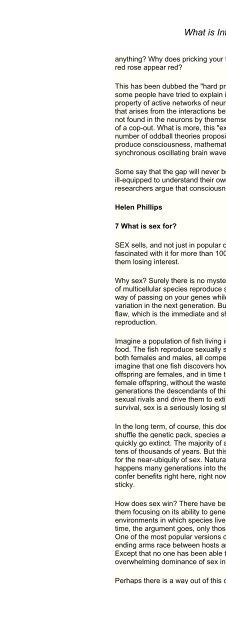07.+What+is+Intelligence+(February+2006) - Get a Free Blog
07.+What+is+Intelligence+(February+2006) - Get a Free Blog
07.+What+is+Intelligence+(February+2006) - Get a Free Blog
Create successful ePaper yourself
Turn your PDF publications into a flip-book with our unique Google optimized e-Paper software.
What is Intelligence? 131<br />
anything? Why does pricking your finger feel like pain? Why does a<br />
red rose appear red?<br />
This has been dubbed the "hard problem" of consciousness, and<br />
some people have tried to explain it away by calling it an emergent<br />
property of active networks of neurons - in other words, something<br />
that arises from the interactions between these neurons, but which is<br />
not found in the neurons by themselves. That, however, seems a bit<br />
of a cop-out. What is more, this "explanatory gap" has attracted a<br />
number of oddball theories proposing weird quantum states that<br />
produce consciousness, mathematical explanations as to why<br />
synchronous oscillating brain waves may be the key, and so on.<br />
Some say that the gap will never be bridged because our brains are<br />
ill-equipped to understand their own consciousness. And some<br />
researchers argue that consciousness is just an illusion anyway.<br />
Helen Phillips<br />
7 What is sex for?<br />
SEX sells, and not just in popular culture. Biologists have been<br />
fascinated with it for more than 100 years and there's no danger of<br />
them losing interest.<br />
Why sex? Surely there is no mystery there - the reason 99.9 per cent<br />
of multicellular species reproduce sexually is because it is the best<br />
way of passing on your genes while ensuring there is plenty of<br />
variation in the next generation. But this argument has a fundamental<br />
flaw, which is the immediate and short-term wastefulness of sexual<br />
reproduction.<br />
Imagine a population of fish living in a lake and competing for limited<br />
food. The fish reproduce sexually so each new generation contains<br />
both females and males, all competing for the same resources. Now<br />
imagine that one fish discovers how to reproduce asexually. All her<br />
offspring are females, and in time they will all produce their own<br />
female offspring, without the wasteful need for males. In just a few<br />
generations the descendants of this single fish will outnumber their<br />
sexual rivals and drive them to extinction. In the day-to-day battle for<br />
survival, sex is a seriously losing strategy.<br />
In the long term, of course, this does not hold true. Without sex to<br />
shuffle the genetic pack, species accumulate harmful mutations and<br />
quickly go extinct. The majority of asexual species last only a few<br />
tens of thousands of years. But this is not a satisfactory explanation<br />
for the near-ubiquity of sex. Natural selection doesn't care what<br />
happens many generations into the future. To win the day, sex must<br />
confer benefits right here, right now. And that's where things get<br />
sticky.<br />
How does sex win? There have been dozens of suggestions, most of<br />
them focusing on its ability to generate variety. Because the<br />
environments in which species live can vary so much in space and<br />
time, the argument goes, only those that can adapt rapidly survive.<br />
One of the most popular versions of this idea concerns the neverending<br />
arms race between hosts and parasites. Problem solved.<br />
Except that no one has been able to prove that this accounts for the<br />
overwhelming dominance of sex in nature.<br />
Perhaps there is a way out of this conundrum. Sex may be


